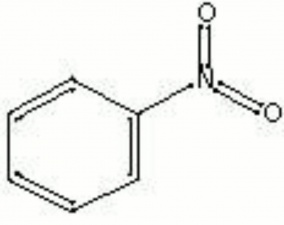Difference between revisions of "Nitrobenzene"
Jump to navigation
Jump to search
(username removed) |
|||
| (4 intermediate revisions by 3 users not shown) | |||
| Line 1: | Line 1: | ||
== Description == | == Description == | ||
| − | A pale yellow, viscous liquid formed by the reaction of fuming [ | + | A pale yellow, viscous liquid formed by the reaction of fuming [[nitric%20acid|nitric acid]] on [[benzene|benzene]]. Nitrobenzene was discovered by Mitscherlich in 1834. When cooled, it forms bright yellow crystals. Nitrobenzene is very toxic. It is used in the manufacture of [[aniline%20dye|aniline dyes]]. as well as being an ingredient in [[soap|soaps]], [[polish%20%28material%29|polishes]] (metal and shoe), and [[lubricant|lubricating oils]]. |
| − | + | [[[SliderGallery rightalign|nitrobenzene.jpg~Chemical structure]]] | |
== Synonyms and Related Terms == | == Synonyms and Related Terms == | ||
oil of mirbane; myrbane; nitrobenzol; essence of mirbane | oil of mirbane; myrbane; nitrobenzol; essence of mirbane | ||
| − | + | == Risks == | |
| − | == | + | * Toxic by inhalation, ingestion and skin contact. |
| + | * Combustible. Flash point = 88 C (190 F) | ||
| + | * ThermoFisher: [https://www.fishersci.com/store/msds?partNumber=AC166360050&productDescription=NITROBENZENE-D5%2C+99+ATOM+5GR&vendorId=VN00032119&countryCode=US&language=en SDS] | ||
| + | * EPA lists nitrobenzene as hazardous waste due to its toxicity; concentrations over 10% must be disposed of appropriately | ||
| + | == Physical and Chemical Properties == | ||
Soluble in ethanol, benzene, ether, and oils. Slightly soluble in water. | Soluble in ethanol, benzene, ether, and oils. Slightly soluble in water. | ||
| Line 22: | Line 26: | ||
|- | |- | ||
! scope="row"| Melting Point | ! scope="row"| Melting Point | ||
| − | | 5.7 | + | | 5.7 C |
|- | |- | ||
! scope="row"| Density | ! scope="row"| Density | ||
| − | | 1.19867 | + | | 1.19867 g/ml |
|- | |- | ||
! scope="row"| Molecular Weight | ! scope="row"| Molecular Weight | ||
| Line 34: | Line 38: | ||
|- | |- | ||
! scope="row"| Boiling Point | ! scope="row"| Boiling Point | ||
| − | | 210-211 | + | | 210-211 C |
|} | |} | ||
| − | == | + | ==Resources and Citations== |
| − | |||
| − | |||
| − | |||
| − | |||
| − | |||
| − | |||
| − | |||
| − | |||
| − | * | + | * Richard S. Lewis, ''Hawley's Condensed Chemical Dictionary'', Van Nostrand Reinhold, New York, 10th ed., 1993 |
| − | * | + | * Susan E. Schur, Conservation Terminology: A review of Past & Current Nomenclature of Materials, ''Technology and Conservation'', Spring (p.34-39); Summer (p.35-38); Fall (p.25-36), 1985 |
| − | * | + | * Random House, ''Webster's Encyclopedic Unabridged Dictionary of the English Language'', Grammercy Book, New York, 1997 |
* ''The Merck Index'', Martha Windholz (ed.), Merck Research Labs, Rahway NJ, 10th edition, 1983 Comment: entry 6685 | * ''The Merck Index'', Martha Windholz (ed.), Merck Research Labs, Rahway NJ, 10th edition, 1983 Comment: entry 6685 | ||
| − | * | + | * F. Crace-Calvert, ''Dyeing and Calico Printing'', Palmer & Howe, London, 1876 Comment: p. 355 |
* ''CRC Handbook of Chemistry and Physics'', Robert Weast (ed.), CRC Press, Boca Raton, Florida, v. 61, 1980 Comment: ref. index=1.550 | * ''CRC Handbook of Chemistry and Physics'', Robert Weast (ed.), CRC Press, Boca Raton, Florida, v. 61, 1980 Comment: ref. index=1.550 | ||
Latest revision as of 12:51, 17 April 2024
Description
A pale yellow, viscous liquid formed by the reaction of fuming Nitric acid on Benzene. Nitrobenzene was discovered by Mitscherlich in 1834. When cooled, it forms bright yellow crystals. Nitrobenzene is very toxic. It is used in the manufacture of aniline dyes. as well as being an ingredient in soaps, polishes (metal and shoe), and lubricating oils.
Synonyms and Related Terms
oil of mirbane; myrbane; nitrobenzol; essence of mirbane
Risks
- Toxic by inhalation, ingestion and skin contact.
- Combustible. Flash point = 88 C (190 F)
- ThermoFisher: SDS
- EPA lists nitrobenzene as hazardous waste due to its toxicity; concentrations over 10% must be disposed of appropriately
Physical and Chemical Properties
Soluble in ethanol, benzene, ether, and oils. Slightly soluble in water.
| Composition | C6H5NO2 |
|---|---|
| CAS | 98-95-3 |
| Melting Point | 5.7 C |
| Density | 1.19867 g/ml |
| Molecular Weight | mol. wt.=123.11 |
| Refractive Index | 1.550 |
| Boiling Point | 210-211 C |
Resources and Citations
- Richard S. Lewis, Hawley's Condensed Chemical Dictionary, Van Nostrand Reinhold, New York, 10th ed., 1993
- Susan E. Schur, Conservation Terminology: A review of Past & Current Nomenclature of Materials, Technology and Conservation, Spring (p.34-39); Summer (p.35-38); Fall (p.25-36), 1985
- Random House, Webster's Encyclopedic Unabridged Dictionary of the English Language, Grammercy Book, New York, 1997
- The Merck Index, Martha Windholz (ed.), Merck Research Labs, Rahway NJ, 10th edition, 1983 Comment: entry 6685
- F. Crace-Calvert, Dyeing and Calico Printing, Palmer & Howe, London, 1876 Comment: p. 355
- CRC Handbook of Chemistry and Physics, Robert Weast (ed.), CRC Press, Boca Raton, Florida, v. 61, 1980 Comment: ref. index=1.550
